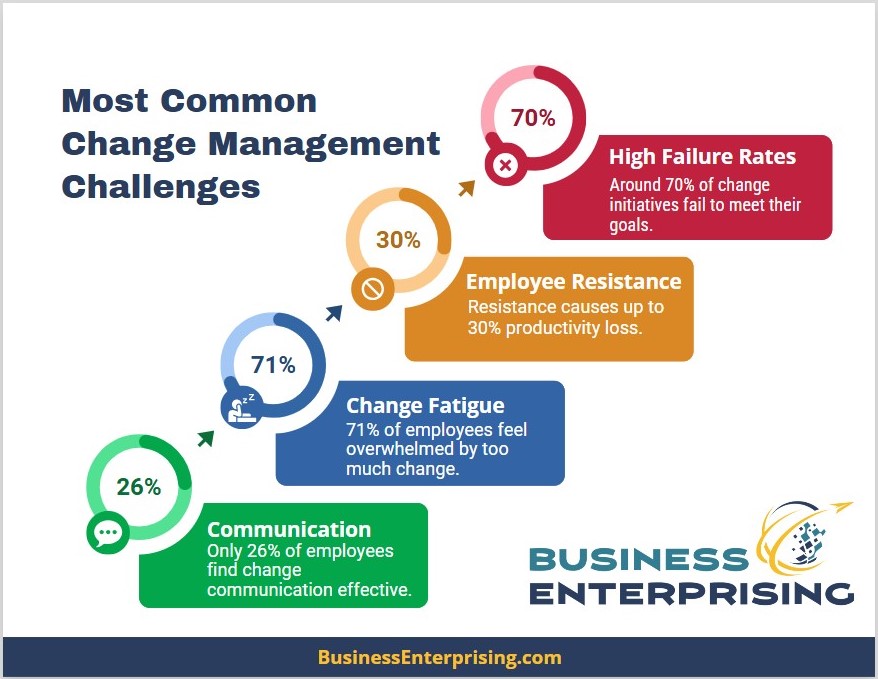
Additionally, successful change requires strong leadership and sustained engagement from your team. Without consistent support and clear strategies, changes often fail to stick. Therefore, it’s important to plan carefully, communicate openly, and evaluate progress regularly.
By recognizing potential challenges early, you can create a smoother path for implementing change. These strategies will help you guide your organization through transitions with greater confidence and success.
Understanding Resistance to Change
Resistance to change is one of the most common change management challenges organizations face. Employees often resist change due to fear of the unknown, concerns about job security, or discomfort with new processes. When uncertainty grows, it can lead to anxiety and a reluctance to embrace new initiatives. Therefore, understanding these fears is key to addressing resistance effectively.
Additionally, organizational culture plays a significant role in shaping attitudes toward change. A culture that values tradition over innovation may foster skepticism about new directions. Without clear communication, employees may assume the worst, leading to misunderstandings and further resistance. However, open dialogue and transparency can help reduce these fears and build trust.
Fear of failure is another factor contributing to resistance. Employees may worry about lacking the skills or resources to succeed in a changing environment. Therefore, providing support and training is essential to easing these concerns. By addressing the root causes of resistance, you can navigate change management challenges more effectively and foster a culture that embraces transformation.
Communication Breakdown During Transitions
Poor communication during transitions is one of the most significant change management challenges organizations face. When messaging is unclear or inconsistent, employees may feel confused or excluded from the process. This uncertainty can lead to frustration, misaligned expectations, and resistance to change. Therefore, establishing clear and consistent communication is essential to guiding your team through transitions.
Additionally, when leaders fail to share the rationale behind changes, employees may speculate or fill gaps with inaccurate assumptions. This lack of transparency often erodes trust and weakens morale. However, open communication that explains the purpose, benefits, and impact of change can help build confidence and understanding.
During transitions, poor communication strategies can also result in missed opportunities to address employee concerns. When leaders do not actively listen, employees may feel undervalued, further fueling resistance. Therefore, fostering two-way communication is key to creating a sense of inclusion and ownership. By addressing these challenges head-on, you can minimize confusion and set a strong foundation for successful change.
Lack of Leadership Support
Lack of leadership support is one of the most challenging barriers to successful change initiatives. When leaders do not actively champion change, employees may doubt its importance or necessity. This lack of buy-in at the top sends mixed signals and can quickly undermine your efforts. Therefore, visible and consistent leadership support is essential to driving successful transitions.
Additionally, weak leadership support often results in poor resource allocation. Without guidance and advocacy from leaders, teams may lack the tools or authority needed to implement changes effectively. However, when leaders actively participate, they set a clear example and empower others to follow through.
Leadership support also plays a critical role in building trust during transitions. When leaders remain disengaged, employees may feel disconnected from the process and resist changes. By contrast, engaged leaders can foster open communication, address concerns, and encourage collaboration. Addressing these change management challenges requires committed leadership that demonstrates both clarity and confidence in the direction of change.
Inadequate Resources and Training
Inadequate resources and training are significant obstacles that can derail change initiatives. Without proper tools or budgets, teams may struggle to implement changes effectively. Insufficient resources often lead to delays, frustration, and incomplete results. Therefore, allocating the right support is key to overcoming these change management challenges.
Additionally, lack of training leaves employees unprepared to adapt to new processes or systems. Without the necessary skills, they may feel overwhelmed or resistant to change. However, providing comprehensive and timely training can build confidence and reduce resistance. Employees who understand how to use new tools or approaches are more likely to embrace the changes.
Poor resource planning also affects morale. When teams feel unsupported, motivation decreases, and the initiative’s success is jeopardized. Addressing these issues requires leaders to anticipate resource needs and involve employees in the planning process. By tackling these challenges early, you can create a smoother transition and set your team up for success.
Maintaining Employee Engagement and Morale
Maintaining employee engagement and morale during organizational changes is one of the most difficult change management challenges. Disruptive changes often create uncertainty, which can lead to decreased motivation and productivity. However, you can mitigate these effects by fostering open communication and involving employees in the process. When teams feel included, they are more likely to stay engaged and supportive.
Additionally, recognizing and addressing employee concerns is essential to maintaining morale. Regularly checking in with your team allows you to understand their challenges and provide necessary support. Providing clear updates and showing appreciation for their efforts helps reinforce their value. Therefore, consistent feedback and recognition can boost confidence and sustain motivation during transitions.
Creating opportunities for collaboration also keeps employees invested in the change process. When teams work together to solve problems or contribute ideas, they feel more connected to the outcomes. Empowering employees to have a voice strengthens their commitment and sense of ownership. By prioritizing engagement and morale, you create a stronger foundation for successfully navigating change management challenges.
Measuring and Sustaining Change
Measuring and sustaining change is one of the most persistent change management challenges organizations face. Evaluating success requires clear benchmarks and measurable goals. Without these, it becomes difficult to determine if new processes or systems are performing as intended. Therefore, setting specific metrics and tracking progress regularly is essential for meaningful evaluation.
Additionally, sustaining change over the long term requires consistent reinforcement. New processes can easily be abandoned if employees revert to old habits. However, regular training, ongoing support, and leadership involvement can help maintain momentum and ensure lasting adoption. Clear communication about progress and success also motivates employees to stay committed.
Resistance can re-emerge if change feels temporary or lacks visible benefits. Therefore, celebrating milestones and sharing positive outcomes keeps teams engaged. By addressing these challenges and focusing on measurable, sustainable practices, you can maximize the success of your change initiatives and build lasting improvements.
Conclusion
Addressing change management challenges requires careful planning, strong communication, and consistent leadership. Without these elements, transitions can falter and create unnecessary disruptions. However, by understanding common obstacles like resistance, poor communication, and lack of resources, you can better prepare your organization for success.
Additionally, measuring and sustaining change ensures that new processes become lasting improvements. Regular evaluations and visible support from leaders keep teams engaged and focused. Therefore, maintaining clear goals and open dialogue throughout the process is essential to achieving long-term results.
By proactively managing these challenges, you can create a more adaptable organization. With the right strategies, your team can navigate change more effectively and embrace new opportunities.



